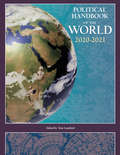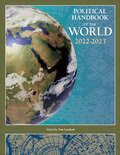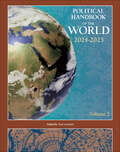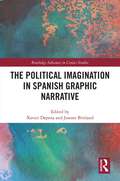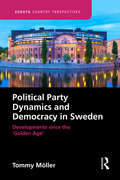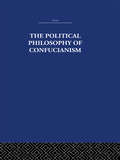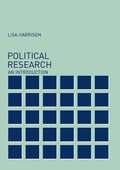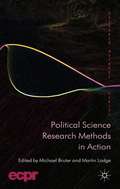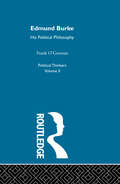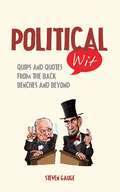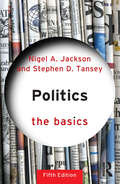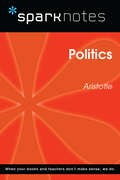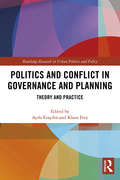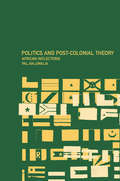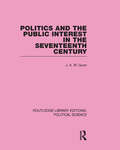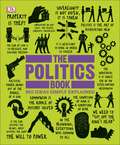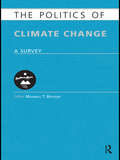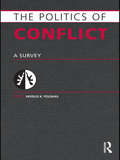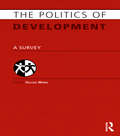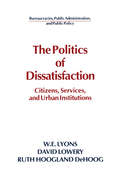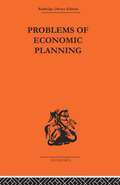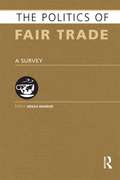- Table View
- List View
Political Handbook of the World 2020-2021 (Political Handbook of the World)
by Tom LansfordThe Political Handbook of the World by Tom Lansford provides timely, thorough, and accurate political information, with more in-depth coverage of current political controversies than any other reference guide. The updated 2020-2021 edition will continue to be the most authoritative source for finding complete facts and analysis on each country′s governmental and political makeup. Compiling in one place more than 200 entries on countries and territories throughout the world, this volume is renowned for its extensive coverage of all major and minor political parties and groups in each political system. The Political Handbook of the World 2020-2021 also provides names of key ambassadors and international memberships of each country, plus detailed profiles of more than 30 intergovernmental organizations and UN agencies. And this update will aim to include coverage of current events, issues, crises, and controversies from the course of the last two years.
Political Handbook of the World 2022-2023 (Political Handbook of the World)
by Tom LansfordThe Political Handbook of the World 2022-2023 provides timely, thorough, and accurate political information, with more in-depth coverage of current political controversies than any other reference guide. The updated 2022-2023 edition continues to be the most authoritative source for finding complete facts and analysis on each country′s governmental and political makeup. Tom Lansford has compiled in one place more than 200 entries on countries and territories throughout the world, this volume is renowned for its extensive coverage of all major and minor political parties and groups in each political system. It also provides names of key ambassadors and international memberships of each country, plus detailed profiles of more than 30 intergovernmental organizations and UN agencies. And this update will aim to include coverage of current events, issues, crises, and controversies from the course of the last two years.
Political Handbook of the World 2022-2023 (Political Handbook of the World)
by Tom LansfordThe Political Handbook of the World 2022-2023 provides timely, thorough, and accurate political information, with more in-depth coverage of current political controversies than any other reference guide. The updated 2022-2023 edition continues to be the most authoritative source for finding complete facts and analysis on each country′s governmental and political makeup. Tom Lansford has compiled in one place more than 200 entries on countries and territories throughout the world, this volume is renowned for its extensive coverage of all major and minor political parties and groups in each political system. It also provides names of key ambassadors and international memberships of each country, plus detailed profiles of more than 30 intergovernmental organizations and UN agencies. And this update will aim to include coverage of current events, issues, crises, and controversies from the course of the last two years.
Political Handbook of the World 2024-2025 (Political Handbook of the World)
by Tom LansfordThe Political Handbook of the World 2024–2025 is the most authoritative and comprehensive reference guide available for understanding the political landscape of every nation and territory across the globe. This updated edition features more than 200 entries, offering detailed coverage of governmental structures, political parties, and current leadership. Known for its unmatched depth, the volume provides in-depth analysis of both major and minor political parties and movements, and delivers timely insights into recent controversies, political crises, and key events from the past two years. This edition also includes up-to-date listings of ambassadors, international organization memberships, and expanded profiles of over 30 intergovernmental organizations and UN agencies. Trusted by researchers, analysts, journalists, and students, this resource continues to deliver essential, reliable political data and analysis.
Political Handbook of the World 2024-2025 (Political Handbook of the World)
by Tom LansfordThe Political Handbook of the World 2024–2025 is the most authoritative and comprehensive reference guide available for understanding the political landscape of every nation and territory across the globe. This updated edition features more than 200 entries, offering detailed coverage of governmental structures, political parties, and current leadership. Known for its unmatched depth, the volume provides in-depth analysis of both major and minor political parties and movements, and delivers timely insights into recent controversies, political crises, and key events from the past two years. This edition also includes up-to-date listings of ambassadors, international organization memberships, and expanded profiles of over 30 intergovernmental organizations and UN agencies. Trusted by researchers, analysts, journalists, and students, this resource continues to deliver essential, reliable political data and analysis.
The Political Imagination in Spanish Graphic Narrative (Routledge Advances in Comics Studies)
by Xavier Dapena Joanne BritlandIn a spirit of community and collective action, this volume offers insights into the complexity of the political imagination and its cultural scope within Spanish graphic narrative through the lens of global political and social movements. Developed during the critical years of the COVID-19 pandemic and global lockdown, the volume and its chapters reflect the interdisciplinary nature of the comic. They employ a cultural studies approach with different theoretical frameworks ranging from debates within comics studies, film and media theory, postcolonialism, feminism, economics, multimodality, aging, aesthetics, memory studies, food studies, and sound studies, among others. Scholars and students working in these areas will find the book to be an insightful and impactful resource.
Political Party Dynamics and Democracy in Sweden: Developments since the ‘Golden Age’ (Europa Country Perspectives)
by Tommy MollerSweden has often been described as a democratic forerunner, with one of the world's most stable party systems and with a well-functioning parliamentary system. However, the political landscape in Sweden has undergone a rapid change in recent years. The institutions of the political system – not least political parties – appear from a historical perspective to have become partly dysfunctional. The previously stable party system has become unstable. Consequently, it has become more difficult to form governments, and more difficult for governments to govern. The famous culture of consensus has been replaced by a harsher and more confrontational political climate; the tone in political debate has become more aggressive. During the so-called `golden age' of the party system, which lasted for a few decades from the middle of the twentieth century, parties could successfully mobilize broad and well-defined social interests with strong collective identities. Now, other conditions apply that have dramatically changed the role of parties in the democratic process. Parties have gone from being member-based popular movements to becoming professionalized voter-orientated campaign machines. Short-sightedness and a focus on median voters mean that the established parties have become increasingly similar, and populist parties have had great success in recent decades as a consequence. This volume, aimed at political scientists and those interested in discussion and analysis of Swedish political party dynamics, focuses on political parties in Sweden, how they have changed and what the changes mean in a wider sense.
The Political Philosophy of Confucianism: An interpretation of the social and political ideas of Confucius, his forerunners, and his early disciples.
by Leonard Shihlien HsüFirst published in 1932.One of the most astonishing features of the Confucian teaching to the modern reader is its anticipation of the Spencerian formula of evolution and its adaptation of this to a programme of progress. This volume shows that Confucius' teaching is still relevant in many of its features, not merely for China but also for the West. Contents include: The background of Confucian political philosophy; the state and its origin; political unity and organization; the principle of benevolent government; law and justice; democracy and representation, social evolution.
Political Research: An Introduction
by Lisa Harrison Nicholas StartinPolitical Research: An Introduction has been designed to provide an excellent starting point for those new to the area of Research Methods. It assumes no prior knowledge of the subject and sets out the key issues involved in doing research in Politics. It guides students through a complex and often daunting subject by exploring the many concepts associated with the field, as well as offering practical advice on research practices and information resources. Features and benefits of this textbook include:* boxed case studies in each chapter to illustrate and clarify key concepts, and highlight the practical use of different research methods* a useful glossary, giving easy access to definitions of key terms* a dedicated web-site containing sample material, extra case studies, important links, and essential resources for both teachers and students.
Political Science - Fourth Edition
by Dr S. R. MyneniDr. S. R. Myneni's Political Science is a comprehensive exploration of political theory, institutions, and practices, tailored for students pursuing law and political science. The book examines foundational concepts like the state, sovereignty, law, and justice, tracing their historical and philosophical roots while addressing their modern interpretations. It delves into diverse governmental forms, constitutional principles, and political ideologies such as democracy, socialism, and liberalism. Modern approaches like behavioral and systems analysis are juxtaposed with traditional philosophical and historical perspectives, offering a multidimensional view of political science. Rich with definitions from eminent thinkers and practical insights into law, governance, and public administration, the work underscores the symbiotic relationship between politics and other social sciences. With its methodical structure and emphasis on theoretical and applied knowledge, the book serves as a valuable resource for academic and professional growth in understanding political and legal frameworks.
Political Science Research Methods in Action
by Michael Bruter Martin LodgeThrough accounts from innovative research projects by world-leading political scientists, this volume offers a unique perspective on research methodology. It discusses the practical and intellectual dilemmas researchers face throughout the research process in a wide range of fields from implicit attitude testing to media analysis and interviews.
Political Thinkers: Edmund Burke
by Frank O'GormanFirst published in 1973, this title offers a concise and readable account of Burke's political philosophy. As well as examining the foundation for Burke's thought, the book also provides much needed connections between the fields of history and political theory. Critical comment and analysis of Burke's attitudes to the problems of the second half of the eighteenth century are also included.
Political Wit: Quips and Quotes from the Back Benches and Beyond (Wit Ser.)
by Steven GaugeOrder, order! After a long day at the dispatch box, when your honourable friend’s white paper has made you feel green and your poll ratings have slumped to a new low, hunker down in Speakers’ Corner with this grand coalition of political quips and quotes – you’ll be ready to take on the opposition at any time!
Politics: The Basics. Basics (The Basics)
by Nigel Jackson Stephen D TanseyNow in its fifth edition, Politics: The Basics explores the systems, movements and issues at the cutting edge of modern politics. A highly successful introduction to the world of politics, it offers clear and concise coverage of a range of issues and addresses fundamental questions such as: • Why does politics matter? • Why obey the state? • What are the key approaches to power? • How are political decisions made? • What are the current issues affecting governments worldwide? Accessible in style and topical in content, the fifth edition has been fully restructured to reflect core issues, systems and movements that are at the centre of modern politics and international relations. Assuming no prior knowledge in politics, it is ideal reading for anyone approaching the study of politics for the first time.
Politics (SparkNotes Philosophy Guide)
by SparkNotesPolitics (SparkNotes Philosophy Guide) Making the reading experience fun! SparkNotes Philosophy Guides are one-stop guides to the great works of philosophy–masterpieces that stand at the foundations of Western thought. Inside each Philosophy Guide you&’ll find insightful overviews of great philosophical works of the Western world.
Politics and Conflict in Governance and Planning: Theory and Practice (Routledge Research in Urban Politics and Policy)
by Ayda Eraydin Klaus FreyPolitics and Conflict in Governance and Planning offers a critical evaluation of manifold ways in which the political dimension is reflected in contemporary planning and governance. While the theoretical debates on post-politics and the wider frame of post-foundational political theory provide substantive explanations for the crisis in planning and governance, still there is a need for a better understanding of how the political is manifested in the planning contents, shaped by institutional arrangements and played out in the planning processes. This book undertakes a reassessment of the changing role of the political in contemporary planning and governance. Employing a wide range of empirical research conducted in several regions of the world, it draws a more complex and heterogeneous picture of the context-specific depoliticisation and repoliticisation processes taking place in local and regional planning and governance. It shows not only the domination of market forces and the consequent suppression of the political but also how political conflicts and struggles are defined, tackled and transformed in view of the multifaceted rules and constraints recently imposed to local and regional planning. Switching the focus to how strategies and forms of depoliticised governance can be repoliticised through renewed planning mechanisms and socio-political mobilisation, Politics and Conflict in Governance and Planning is a critical and much needed contribution to the planning literature and its incorporation of the post-politics and post-democracy debate.
Politics and Post-Colonial Theory: African Inflections
by Pal AhluwaliaThis groundbreaking book makes sense of the complexities and dynamics of post-colonial politics, illustrating how post-colonial theory has marginalised a huge part of its constituency, namely Africa.Politics and Post-Colonial Theory traces how African identity has been constituted and reconstituted by examining issues such as:* negritude* the rise of nationalism* decolonisation.The book also questions how helpful post-colonial analysis can be in understanding the complexities which define institutions including:* the nation-state* civil society* human rights* citizenship.Politics and Post-colonial Theory bravely breaks down disciplinary boundaries. Its radical vision will be essential reading for all those engaged in Politics, post-colonial studies and African studies.
Politics and the Public Interest in the Seventeenth Century (Routledge Library Editions)
by J. A. GunnThis book examines the concept of public interest against the background of English politics from the Civil War to the coming of the Hanoverians. These years witnessed both the rise of the modern notion of the public interest as a part of ordinary political language and the growth of a social philosophy of individualism. The new ideas challenged the status quo, based on order, reason of state and national power, in the name of legitimate self-interest and respect for the rights of the private person. In presenting a complex set of ideas in their historical context, the author examines both abstract philosophies and the issues of the day as recorded in press, pulpit and law courts. A chapter devoted to economic thought includes a re-assessment of the social assumptions of mercantilism.
The Politics Book (Big Ideas Simply Explained)
by Dorling Kindersley Publishing StaffFrom ancient and medieval philosophers such as Confucius and Thomas Aquinas, to revolutionary thought leaders such as Thomas Jefferson and Leon Trotsky, to the voices who have shaped modern politics today — Mao Zedong, Malcolm X, Che Guevara, and more — The Politics Book clearly and simply explains more than 100 groundbreaking ideas in the history of political thought. <p><p> With easy-to-follow graphics, succinct quotations, and accessible text, The Politics Book is an essential reference for students and anyone wondering how politics works.
The Politics of Climate Change: A Survey
by Maxwell T. BoykoffClimate change is a defining issue in contemporary life. Since the Industrial Revolution, heavy reliance on carbon-based sources for energy in industry and society has contributed to substantial changes in the climate, indicated by increases in temperature and sea level rise. In the last three decades, concerns regarding human contributions to climate change have moved from obscure scientific inquiries to the fore of science, politics, policy and practices at many levels. From local adaptation strategies to international treaty negotiation, ‘the politics of climate change’ is as pervasive, vital and contested as it has ever been. On the cusp of a new commitment to international co-operation to rein in greenhouse gas emissions, this essential book intervenes to help understand and engage with the dynamic and compelling ‘Politics of Climate Change’. This edited collection draws on a vast array of experience, expertise and perspectives, with authors with backgrounds in climate science, geography, environmental studies, biology, sociology, political science, psychology and philosophy. This reflects the contemporary conditions where the politics of climate change permeates and penetrates all facets of our shared lives and livelihoods. Chapters include the Politics of Climate Science, History of Climate Policy, the Cultural Politics of Climate Change: Interactions in the Spaces of Everyday, the Politics of Interstate Climate Negotiations, the Politics of the Carbon Economy, and Addressing Inequality. An A – Z glossary of key terms offers additional information in dictionary format, with entries on topics including Carbon tax, Stabilization, Renewable technologies and the World Meteorological Organization. A section of Maps offers a visual overview of the effects of environmental change.
Politics of Conflict: A Survey
by Vassilis K. FouskasFour sections present a thorough overview of current issues in the politics of conflict in historical perspective. Essay chapters written by a variety of academic and other experts on topics including conflicts in Latin America, Africa, the Caucasus and Central Asia, South Asia and South-East Asia, the Arab-Israeli Conflict and Yugoslavia provide background analysis and information on some of the key aspects of conflicts in the world. It also includes an A – Z glossary of conflicts in the world, Maps of countries and regions and a select bibliography.
Politics of Development: A Survey
by Heloise WeberThe Politics of Development: A Survey provides an overview of the intrinsically political relations of development. It brings together essays written by experts in the politics of development and covers a range of significant and topical concerns: gender, race, indigenous development, social movements, religion, security, environmental concerns, colonialism and its legacies, migration, the political economy of development, trajectories in urbanization, and the agrarian question. It introduces and examines key concepts and approaches which have underpinned development, as well as the struggles it has engendered historically, and in contemporary contexts. This volume provides critical insights into the global politics of development and offers alternative analytical frameworks for understanding the relationships around development and inequalities. The Politics of Development: A Survey is organized in an accessible manner, catering to a wide audience (ranging from undergraduates at University level to practitioners and Non-Governmental Organizations [NGOs] engaged in advocacy as well as practical political aspects), and provides introductions to key issues and themes around contemporary challenges and opportunities in development. The title also includes an A-Z Glossary, covering key terms, organizations, concepts and actors in the politics of development.
The Politics of Dissatisfaction: Citizens, Services and Urban Institutions (Bureaucracies, Public Administration, And Public Policy Ser.)
by William E. Lyons David Lowery Ruth Hoogland DeHoogThe Politics of Dissatisfaction: Citizens, Services, and Urban Institutions is destined to be a classic in public administration and public policy; it makes major theoretical and empirical contributions to the literature in both fields. It is a rigorous empirical attempt to assess the public choice view of citizenship and local government. The research upon which this book is based was founded on conversations between two of its authors, W. E. Lyons and David Lowery, during the early 1980s.
Politics of Economic Planning: Papers on Planning and Economics
by E.F.M. DurbinThe issue of planning prompted some of the fiercest debate in mid-twentieth century economics. Politics of Economic Planning collects together a number of papers from journals and contributed books that examine the problems of economic planning in a free society. They fall into three groups:Part 1 explains the idea of socialism and defines it in relation to democracy.Part 2 discusses problems of economic planning both in relation to political economy on the practice of planning and with the application of the theory of value to the conditions of a centrally directed economy.Part 3 examines the nature of economics.
The Politics of Fair Trade: A Survey
by Meera WarrierThe Politics of Fair Trade is a brand new title that explores the current issues in fair trade, featuring in-depth analysis by the leading experts in this field. Edited by Meera Warrier, this exciting title boasts case studies of the key commodities involved in fair trade issues, plus an A-Z of entries dealing with issues, organizations, disputes, and relevant countries with regard to fair trade.
